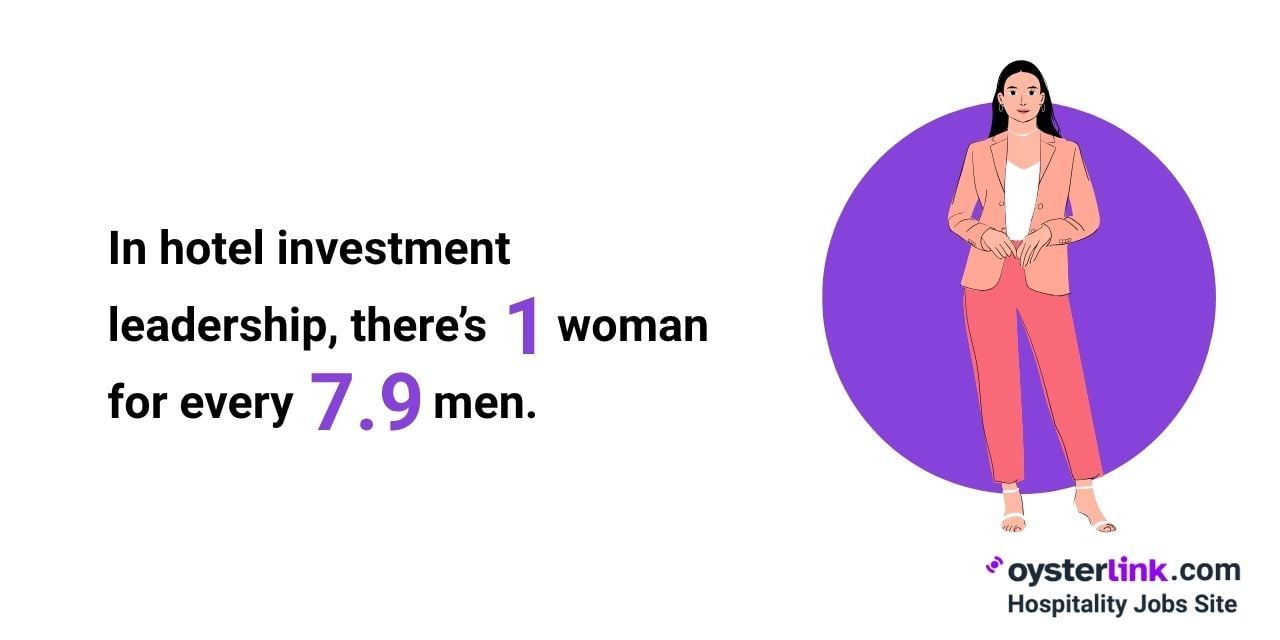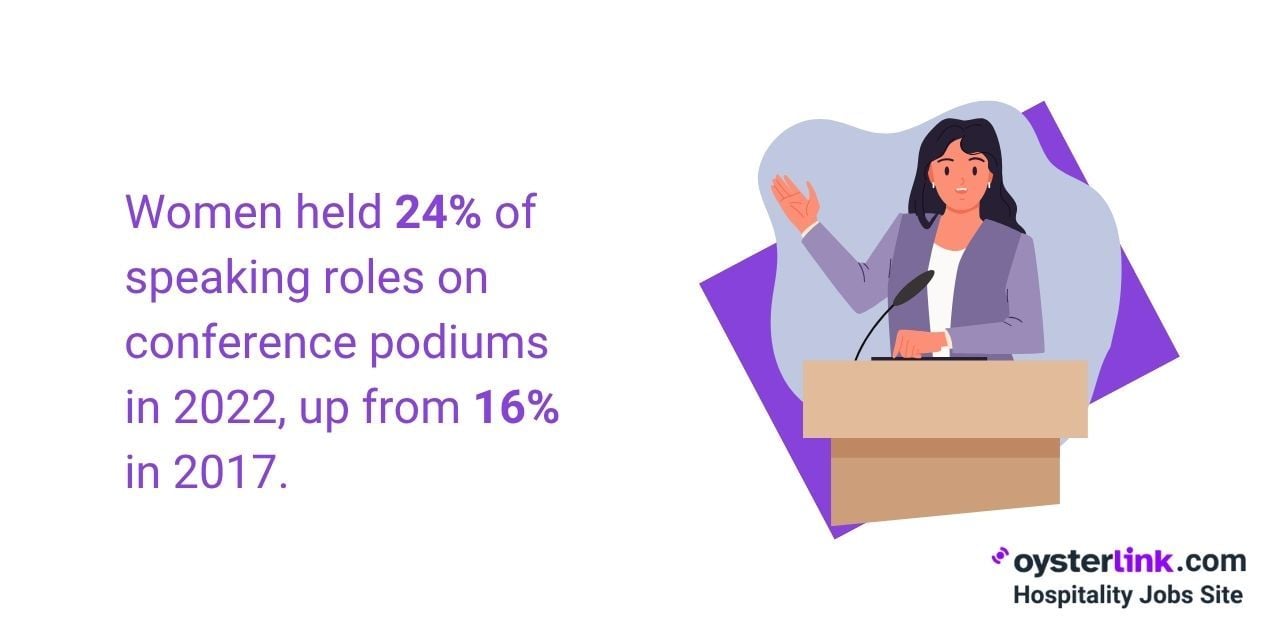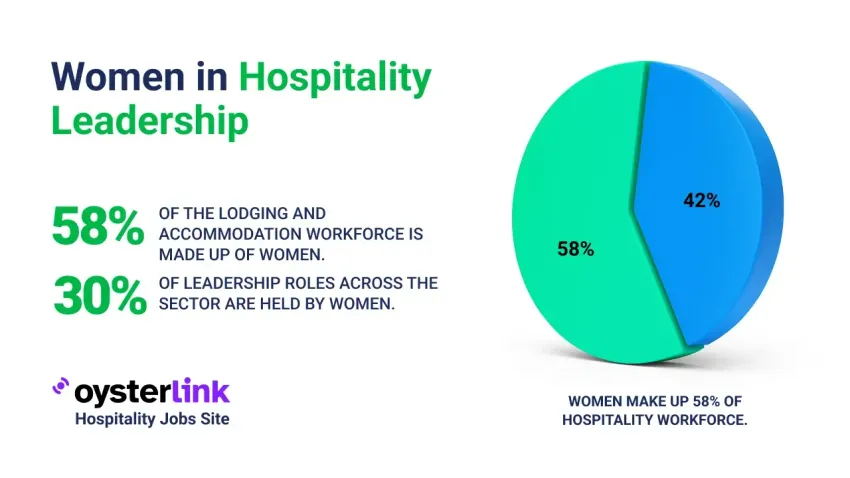Despite making up the majority of the hospitality workforce, women in hospitality continue to face significant barriers in reaching the industry's highest leadership levels.
This article explores where progress has been made, where gaps remain and why advancing women into senior roles is essential for the future of hospitality.
Women in the Hospitality Workforce
Women have long formed the backbone of the hospitality industry, particularly in customer-facing, operational and mid-level roles.
In the U.S. lodging and accommodation sector, they make up 58% of the workforce, underscoring the industry’s strong reliance on female talent in areas like guest services, front-of-house operations and hotel administration.
In recent years, women have also begun stepping into higher-impact leadership roles across hotel operations, human resources, finance, culinary arts and corporate strategy.
This shift signals growing recognition of their value beyond support functions. However, despite this progress, women remain significantly underrepresented at the top.
Only 30% of leadership roles across the hospitality sector are held by women, and while gender parity has been reached at the director level, representation drops sharply in more senior roles.
According to AHLA Report on Women in Hospitality, at the chief level, women hold just 25% of positions, primarily in HR and sales/marketing.
Leadership Disparities Among Women in Hospitality
As women ascend the leadership ladder, the gap in representation becomes more pronounced.
While they have achieved parity at mid-management levels, their numbers steadily decline in roles that involve broader decision-making power, such as financial oversight and long-term strategy.
These positions often require profit-and-loss responsibility or control over organizational direction — areas where women have historically had less access.
The data below illustrates a clear drop-off in representation at each step of the executive hierarchy:
Leadership Level | Ratio of Men to Women |
| Vice President (VP) | 1.7:1 |
| EVP/SVP | 2.7:1 |
| Managing Director | 4.4:1 |
| President | 10.3:1 |
| CEO | 16.1:1 |
Closing these gaps will require more than promotion — it demands rethinking how leadership potential is identified, developed and supported across the industry.
Gains in Investment and Development for Women in Hospitality
Hospitality investment and development — covering hotel ownership, asset management and capital allocation — has traditionally been dominated by men.
These roles often involve dealmaking, financial risk and long-term capital planning, making them particularly difficult for women to access due to limited sponsorship, fewer role models and systemic exclusion from investor networks.
Still, there are signs of progress. In 2019, there was 1 woman for every 10 men in hotel investment leadership.
By 2022, that ratio had improved slightly to 1 woman for every 7.9 men.

At the partner and principal level — the most senior tier in development firms — representation remains low, with 11.4 men for every woman, though this marks an improvement from 15.3:1 in 2019.
These gains reflect a growing presence of women in ownership pipelines, particularly in emerging sectors like boutique real estate firms, family offices and alternative investment structures.
Yet, achieving equity in capital control and asset strategy will require intentional shifts in access to capital, leadership training and investor mentorship.
Women in Hospitality: Conference and Podium Representation
Visibility on stage at major hospitality conferences is a key marker of leadership credibility.
These platforms are where industry leaders shape narratives, exchange ideas and influence the direction of business. For women, presence on the podium is about more than optics — it’s about recognition, access and authority.
Encouragingly, podium roles held by women rose to 24% in 2022, up from 16% in 2017.

Main stage speaking roles also saw a significant jump, reaching 37% in 2022, compared to 22% in 2021. However, moderator roles declined to 26%, down from 36% the previous year, and women remain outnumbered roughly three to one in conference leadership roles from director to CEO levels.
Boosting stage presence matters — not just for career visibility, but for reshaping who gets to be seen as an industry authority.
For true inclusion to take hold, event organizers, sponsors and decision-makers must continue working toward gender balance across speaker lineups, panels and leadership tracks.
Why Women in Hospitality Leadership Matters
Before diving into the data, hear directly from one of the industry’s most influential voices. In this video, Gilda Perez-Alvarado, CEO of Orient Express and Group Chief Strategy Officer at Accor, shares her advice for women building long-term careers in hospitality:
Increasing the presence of women in hospitality leadership isn’t just about equity — it drives measurable benefits for businesses, teams and the industry as a whole:
- Stronger financial performance: Studies across industries show that companies with diverse leadership teams, including gender diversity, tend to outperform their peers on profitability and innovation.
- Improved workplace culture and retention: Women leaders often bring inclusive, collaborative management styles that enhance employee engagement, reduce turnover and improve team morale — critical in a high-touch service industry like hospitality.
- Broader talent pipelines: Promoting women into leadership roles signals opportunity and fairness, helping attract and retain top talent from diverse backgrounds across all levels of the organization.
- Better customer alignment: Hospitality serves a diverse global audience. Having women in decision-making roles leads to better insight into guest preferences, service personalization and brand strategy.
- Expanded innovation and problem solving: Gender-diverse leadership teams bring varied perspectives to the table, which improves creativity, resilience and decision making — especially in rapidly changing markets like travel, tourism and hospitality tech.
Investing in women’s advancement isn’t just the right thing to do — it’s a smart strategy for long-term business success in a competitive, people-driven industry.
Notable Women in Hospitality: A Look at 10 Industry Leaders
These 10 women stand out not only for their seniority but for their lasting impact across the global hospitality industry.
Chosen for their prominence, leadership rank, career longevity and visibility within hotel operations, investment, people strategy or culinary excellence, each of them represents a distinct area of influence.
From CEOs and COOs to visionary Chefs and Brand Strategists, these leaders are redefining what success looks like in hospitality.
1. Sheila Johnson – Founder & CEO, Salamander Hotels & Resorts
Sheila Johnson is a pioneering entrepreneur and the first Black woman to own a portfolio of luxury hotels in the United States.
She founded Salamander Hotels & Resorts in 2005, a hospitality brand known for its upscale properties and commitment to community-focused service.
Prior to entering hospitality, she co-founded Black Entertainment Television (BET), showcasing her breadth as a business leader.
Johnson is also Vice Chairman of Monumental Sports & Entertainment, which owns major teams like the Washington Wizards and Capitals.
Her cross-industry impact makes her one of the most powerful figures in American business and hospitality.
2. Clare Smyth – Chef & Owner, Core by Clare Smyth
Clare Smyth is the first British female Chef to earn three Michelin stars for her restaurant, Core by Clare Smyth, located in London.
She trained under Gordon Ramsay and led his flagship restaurant before opening her own, gaining global acclaim for refined, ingredient-driven cuisine.
Clare has cooked for royalty, including overseeing the menu at Prince Harry and Meghan Markle’s wedding reception.
She has received the World’s Best Female Chef award and continues to influence fine dining worldwide. Her leadership in the culinary field elevates the visibility of women in Chef-Owner roles globally.
3. Angela Brav – Former CEO, InterContinental Hotels Group (Europe)
Angela Brav held one of the most senior positions in global hospitality as the former CEO of InterContinental Hotels Group (IHG) Europe. With over 25 years of experience, she managed a portfolio of over 700 hotels and thousands of employees across the region.
Brav was recognized for her strong operational leadership and championing employee engagement across IHG brands.
She helped navigate the company through periods of rapid growth and market shifts. Her executive legacy reflects both longevity and impact at one of the world’s largest hotel groups.
4. Asma Khan – Chef & Owner, Darjeeling Express
Asma Khan is a renowned restaurateur and social advocate known for running an all-women kitchen at Darjeeling Express in London. Her restaurant and story were featured on Netflix’s Chef’s Table, making her the first British chef on the series.
She uses her platform to champion immigrant women and gender equity in culinary spaces.
Khan was named one of Time’s 100 most influential people and serves as a UN World Food Programme Chef Advocate. Her work represents a powerful blend of hospitality leadership and social entrepreneurship.
5. Jyoti Chopra – Chief People, Inclusion & Sustainability Officer, MGM Resorts International
Jyoti Chopra holds a top-tier executive role at MGM Resorts International, overseeing over 60,000 employees across HR, DEI and environmental sustainability.
Her background includes leadership roles in global firms like BNY Mellon and Deloitte, giving her broad corporate influence. Chopra is also an advisor to various industry boards on responsible business practices.
At MGM, she plays a pivotal role in embedding equity and resilience into the company’s culture and operations. Her role reflects both functional breadth and executive authority in a Fortune 500 hospitality company.
6. Debbie Totten – SVP, Global Brand Strategy, Marriott Vacations Worldwide
Debbie Totten has nearly three decades of experience shaping brand identity and customer engagement at Marriott Vacations Worldwide.
As SVP of Global Brand Strategy, she oversees creative direction, brand voice and guest loyalty programs. She’s been recognized for transforming legacy brands into modern, experience-driven platforms.
Totten is also a featured voice in women’s leadership initiatives within the travel and hospitality space. Her expertise sits at the intersection of brand storytelling and strategic hospitality growth.
7. Nicki Keenan – SVP of Sales, Fertitta Entertainment
Nicki Keenan leads national sales strategy at Fertitta Entertainment, which owns Landry’s Inc., Golden Nugget Casinos and a wide range of hospitality assets. With over 30 years in the industry, she has consistently driven growth through innovative customer engagement and distribution strategies.
Keenan is recognized among Houston’s top business leaders and Women Who Mean Business. She manages both B2B and B2C programs for one of the most diversified portfolios in hospitality.
Her sustained success highlights operational excellence in both restaurant and hotel segments.
8. Kimberly Furlong – Chief Commercial Officer, Atrium Hospitality
Kimberly Furlong is Chief Commercial Officer at Atrium Hospitality, responsible for company-wide revenue management, sales, and marketing strategies.
With over 25 years of experience, she leads commercial teams supporting over 80 hotels across the U.S. Her work integrates data-driven decision-making with market positioning and guest experience enhancements.
Furlong is instrumental in aligning financial performance with brand growth and long-term strategy. Her position reflects a high level of trust and responsibility within a major hotel management group.
9. Jennifer Rausch – Chief People Officer, Sonesta International Hotels
Jennifer Rausch heads HR for Sonesta, one of the fastest-growing hotel companies in the U.S., managing programs related to recruitment, culture, compensation, and retention.
She joined Sonesta in 2013 and helped steer the company through rapid post-pandemic expansion. Her leadership has been key to building an inclusive, performance-oriented culture.
Rausch brings over two decades of hospitality HR experience to her role. She plays a vital part in shaping the company’s long-term workforce strategy and employee experience.
10. Liz Uber – Chief Operating Officer, Extended Stay America
Liz Uber serves as COO of Extended Stay America (ESA), overseeing hotel operations across the brand’s national footprint. She previously held senior roles at Aimbridge Hospitality and La Quinta, contributing to brand expansion and operational streamlining.
Uber is known for implementing systems that drive guest satisfaction, efficiency and cost control. At ESA, she focuses on optimizing property performance and enhancing workforce training.
Her extensive background and operational focus position her as a key figure in the limited-service hotel segment.
Women in Leadership Roles in Hospitality: Conclusion
While women continue to power much of the hospitality workforce, leadership remains unevenly distributed.
The data makes it clear that progress is underway — especially at the director level and within podium visibility — but the path to the C-suite, ownership and capital-driven roles is still marked by structural barriers.
Elevating more women into strategic and senior positions isn’t just a matter of fairness; it strengthens organizational performance, culture and innovation across the industry.
As more women move into roles of influence — from boardrooms to brand strategy to the investment table — the future of hospitality leadership grows more diverse, resilient and representative.









Loading comments...